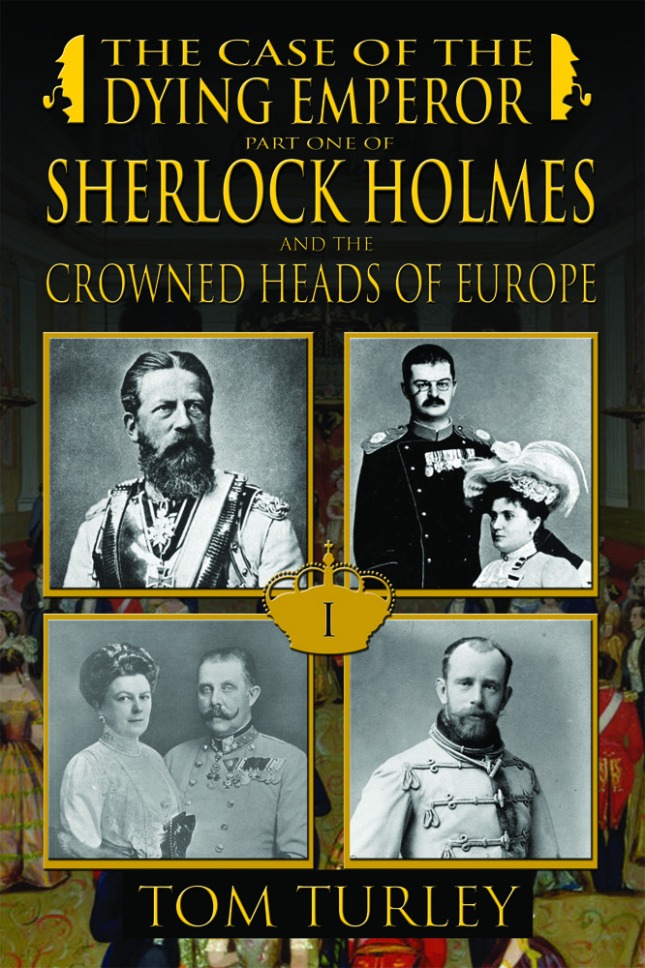The MX Book of New Sherlock Holmes Stories – Author Interview – Tom Turley
Posted by Steve Emecz on
Throughout the Kickstarter campaign, we will be adding brief interviews highlighting the talented authors who have contributed to the anthology. Today we have the excellent Tom Turley.
How did you first get introduced to Sherlock Holmes?
When I was maybe twelve years old, my mother gave me a volume called A Treasury of Sherlock Holmes. It contained two of the novels (A Study in Scarlet and The Hound of the Baskervilles) and 27 of the best short stories, plus an introduction in which Adrian Conan Doyle wrote entertainingly about growing up with his father and Sir Arthur’s attitude toward Sherlock Holmes. Once I read Hound, I never looked back. I acquired other Holmes collections as a teen-ager and eventually read all the Canon, although I didn’t purchase The Complete Sherlock Holmes until I was in college. I also sampled The Exploits of Sherlock Holmes and Nicholas Meyer’s first two Holmes novels, but I never developed a real interest in pastiches until I had an idea for one while mowing the yard one afternoon. That idea became “Sherlock Holmes and the Adventure of the Tainted Canister,” which MX published as an e-book in 2014 (https://www.amazon.com/Sherlock-Holmes-Adventure-Tainted-Canister-ebook/dp/B00J3QS5CW), but which David Marcum turned down for the anthology because its ending is extremely un-Canonical. Fortunately, David was nice enough to invite me to submit a less controversial story, and my next two efforts—“A Scandal in Serbia” and “A Ghost from Christmas Past”—appeared in Parts VI and VII of the MX anthology. We agreed that these stories were “traditional” enough to make the cut, even though they’re not strictly Canonical because they contain elements from Baring-Gould. “Serbia” was panned on that account by one reviewer, but “Ghost” got a nice mention in Publisher’s Weekly’s Part VII review. It was also included in The Art of Sherlock Holmes—West Palm Beach Edition. I’ll stop bragging now, having long since outrun this question’s boundaries.
Which is your favourite story from The Canon and why?
Hound is still my favorite. I was disappointed that Granada’s television version with Jeremy Brett didn’t quite match The Sign of Four. Among the short stories, undoubtedly “The Speckled Band,” which is both wonderfully creepy and masterfully deduced, even though it’s based upon a faulty premise. (Dr. Roylott—one of Doyle’s best villains—could not have trained the “swamp adder” to return to him by whistling, because snakes are deaf.) My other favorites include “A Scandal in Bohemia,” “The Five Orange Pips,” and the bookends to the Great Hiatus: “The Final Problem” and “The Empty House.” All of those stories have contributed usefully to my own works in one way or another.
What was the inspiration for your pastiche?
The underlying inspiration for “The Solitary Violinist” was that David Marcum decided to do another round of pseudo-supernatural tales for the Fall 2019 anthology. I was already working on two stories, but neither had any place for ghosts or goblins. Having missed the last few volumes, I badly wanted to submit something but was stuck for an idea. Happily, at about that time I learned that my favorite composer, Gustav Mahler, had an extremely talented friend and fellow student at the Vienna Conservatory who came to a sad end. Their relationship, and its subsequent (unacknowledged) influence upon Mahler’s music started my creative juices flowing, and I eventually concocted another “ghostly” tale that met David’s criterion of having a non-supernatural explanation in the end.
What is your story about? Where and when does it take place?
Hans Rott, who wrote a wonderful “Mahlerian” symphony several years before Gustav Mahler wrote his First, is “The Solitary Violinist” in my story. Rott ended up in an asylum, and his little-known symphony was not performed until 1989, long after Mahler’s music had become world-famous. Holmes tells Watson the story in 1911, just before departing for the United States as “Altamont.” However, its main action takes place in Vienna in 1902, when Mahler persuades the visiting detective to investigate his apparent “haunting” by a long-dead former friend. To discover why Holmes—whose maxim, as we know, is “No ghosts need apply”—accepted this commission, we return briefly to his college days. The story ends back in Watson’s study with a final ghostly echo, which David kindly permits to authors of his “pseudo-supernatural” anthology selections.
What do you believe readers will most enjoy most about your tale?
Classical music lovers who have not heard of him will find Hans Rott of interest. I have included references to information on the young composer’s life and to recordings of his music. Whether readers love, hate, or ignore the symphonies of Gustav Mahler, he was a fascinating personality. My story treats him less unsympathetically than its plot implies. Mahler’s wife Alma—that seductive “Muse to Genius” who snared two more famous husbands and was parodied in a Tom Lehrer ballad—makes a brief appearance, as does Sigmund Freud. The story explores Holmes’ own fondness for Wagnerian music, which is well-established in the Canon. Finally, there is the fun of seeing him grapple with a case that he finds utterly ridiculous, but which he is compelled for reasons of his own to take.
Any upcoming projects?
I’m currently working on “A Game of Skittles,” a submission for the next MX anthology. It features a famous Victorian courtesan and two eminent statesmen who—in one way or another—made her acquaintance. Had Holmes not solved this case so tactfully, it might have been the Profumo Scandal of the 1880s.
Then it’s back to the next installment of Sherlock Holmes and the Crowned Heads of Europe:four historical tales that immerse our heroes in the diplomacy that preceded World War I. When finished, the collection will include “A Scandal in Serbia” and two more stories I have yet to write. I hope to enlist Marcia Wilson—a talented artist as well as an outstanding Sherlockian pasticheur who focuses on Scotland Yard—to illustrate Crowned Heads.
Meanwhile, Crowned Heads’ longest and earliest story chronologically, “The Case of the Dying Emperor,” is already done and is available from MX Publishing as a separate e-book (https://www.amazon.com/Sherlock-Holmes-Emperor-Crowned-Europe-ebook/dp/B07LCMVKDD/). It takes place in 1888, during the brief reign of Frederick III, the son-in-law of Queen Victoria and father of the infamous “Kaiser Bill.” Frederick’s premature demise inaugurated Sherlock Holmes’ espionage campaign against the German Empire, which (as we know) ended only in August 1914 with “His Last Bow.” My story has received kind reviews from three Sherlockian authors I very much admire—S.F. Bennett, David Marcum, and Daniel D. Victor—although Dan did suggest that Crowned Heads substitute a bibliographic essay for the “overabundance” of end notes in the e-book! Readers who like combining Holmes with history will, I hope, enjoy the story, whether they acquire it now or wait for the entire collection.
One other tale on my horizon requires a return to the vexed question of Dr. Watson’s wives. “A Ghost from Christmas Past” introduced Constance Adams, the first of them (courtesy of W.S. Baring-Gould), while “Sherlock Holmes and the Adventure of the Tainted Canister” recorded the sad fate of Mary Morstan. My candidate for Wife Number Three—Priscilla Prescott—has lurked in the wings of other stories, but the case that introduces her to the good doctor will be a Boer War tale, “The Adventure of the Disgraced Captain.” No idea yet how soon it will appear!
Tell us three things about yourself that few people would guess?
Politically, I am a liberal Democrat, which is uncommon among old white men in Alabama.
My other hobby is building model sailing ships, my latest being the frigate U.S.S. President. She was the Constitution’s sister ship and quite a showpiece in her day.
My wife Paula is an aspiring science fiction writer, who has recently finished a novel called The Winds of Onega. We’re looking for a publisher, if MX decides to take on science fiction!
Click here for more details on the Kickstarter campaign.


Share this post
- Tags: Author Interviews
